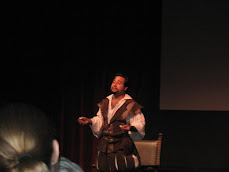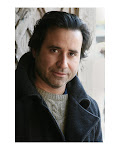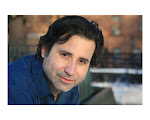WELL-VERSED ACTORS BRING BLOODY POETRY TO LIFE
From: The Miami Herald
Date: November 2, 1993
Author: CHRISTINE DOLEN
You might assume that a play about Percy Bysshe Shelley and Lord Byron, those two great and decidedly unconventional 19th Century British romantic poets, would be arty and full of more poetry than you've heard since freshman English. That it would be a literary history lesson, probably a little on the dull side.
Wrong. Oh, I'm sure you could dramatize the Shelley-Byron relationship that way, but British playwright Howard Brenton certainly defies all those expectations in Bloody Poetry, his 1984 play now being given a thrillingly acted revival by the Florida Shakespeare Festival.
With its second production since Hurricane Andrew's destruction led to a change of both venue and administration, the Coral Gables company further demonstrates its commitment to excellence, staging a provocative play that probably wouldn't otherwise be seen here -- and doing it very, very well.
Bloody Poetry IS a play of ideas, but it also is as juicily lusty a script as you could want. It's a ready-made romp for good actors, and the six in Florida Shakespeare's company dare to play it big. Under John Briggs' intelligent, many-layered direction, they vividly convey the story of reformer-dreamers who inevitably left sorrow in their wake.
Bloody Poetry, whose title is both a curse and a vivid evocation of the poets' duality (artistic genius coupled with spiritual chaos), spans the time from the first meeting of Shelley (John Baldwin) and Byron (Chaz Mena) at Switzerland's Lake Geneve in 1816 to Shelley's drowning in Italy in 1822.
Along for the exhilarating/misery-filled sojourn are Shelley's common-law wife Mary (Liz Dennis), then working on Frankenstein, and her charismatic sister Claire Clairemont (Blaine Dunham), the unapologetic mistress of both men. Also on hand are Byron's biographer, Dr. William Polidori (Adam Koster), to serve as a scandalized narrator; and, first as a guilt-inducing spirit, then as a ghost, Shelley's legal wife, Harriet Westbrook (Stephanie Heller).
The actors artfully convey the discrepancy between philosophy and action. When Shelley receives word of Harriet's death (pregnant by another man and long ignored by her husband, she drowned herself in a shallow lake), Mary's first reaction is to ask the distraught Shelley to marry HER, though they have both disdained the institution of marriage. Free-loving Claire, pregnant with Byron's daughter, schemes fruitlessly to wed the overweight, alcoholic, syphilis-ridden poet, who freely admits he prefers making love to boys. These four are unconventional in the extreme and, for all the pleasure it affords them, it also leads to misery and the deaths of their illegitimate children.
The acting, as noted, is wonderful.
Baldwin, often seen with the Acme Acting Company, is strikingly handsome in his frequent agitation, and he artfully conveys the disparity between Shelley's political idealism and his careless amorality. (You should know that the script calls for him to moon the audience, but the moment is brief and tastefully done.)
Mena, one of South Florida's best and most versatile actors, brings a detailed wantonness to his Byron, giving the man a slight hobble and a drunken expansiveness. His is the most over-the-top performance, but it works.
Dennis' Mary initially seems much too restrained, but her cool logic and wounded spirit makes the choice work, as well as providing a contrast to the flamboyance of the others. Dunham is a revelation, making Claire a husky-voiced yet childlike seductress who actually seems to glow. What an alluring performance!
Bloody Poetry is really a kind of ghost story, so David Trimble's classic and simple set -- white curtains, behind which spirits can be outlined in shadow -- is a striking and effective design choice.
If you see Bloody Poetry -- and you should, if you love good acting -- you will most certainly hear some of the verse that made Shelley and Byron literary legends. But you will also get lost in the far more complex and less orderly lives of geniuses who couldn't shape their lives with anything close to the skill they brought to their poetry.





















No comments:
Post a Comment